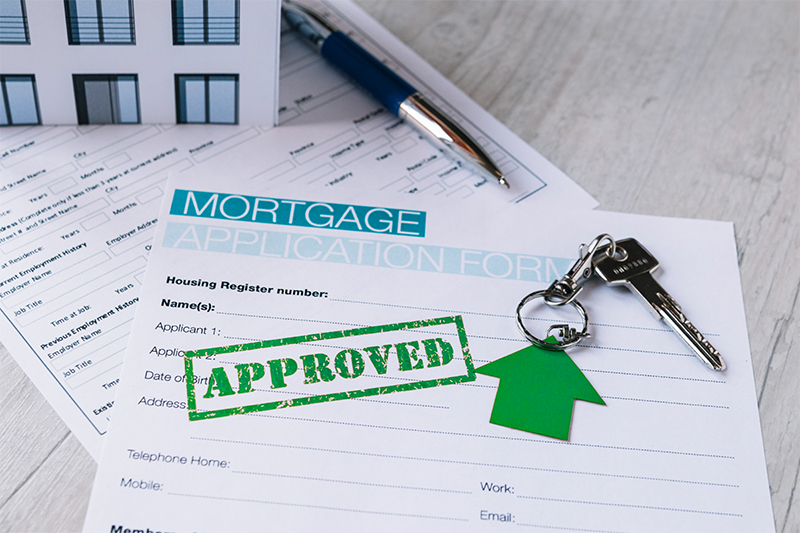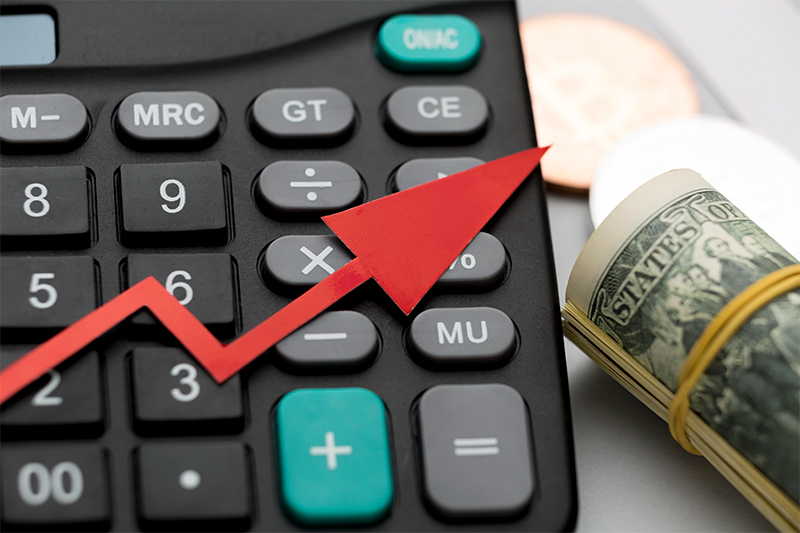Have you recently filed for bankruptcy and are wondering if you can still fulfill your dream of owning a home? Here are some answers to your questions.
Is Buying a House After Bankruptcy Possible?
The good news is that, yes, buying a house after bankruptcy is possible.
Bankruptcy can have a major impact on your credit score and financial standing, but it doesn’t mean that you’ll never be able to buy a house again. The key is to take steps to rebuild your credit and show lenders that you are financially responsible.
After bankruptcy, your credit score will likely take a hit, but with time and responsible financial habits, you can start to rebuild it. This may involve paying bills on time, keeping credit card balances low, and monitoring your credit report for errors.
Having a larger down payment can help you secure a mortgage with more favorable terms, even if your credit score is still in recovery.
Roughly 1% of U.S. households file for bankruptcy each year, and many will be eligible to buy a home within 2 years of their bankruptcy discharge. [1]

How Long After Chapter 7 Bankruptcy Can You Buy a House?
Individuals who have filed for Chapter 7 bankruptcy will have to wait at least two years before they can qualify for a conventional mortgage loan. Take steps to improve your credit score and financial situation. This may include paying all bills on time, reducing debt, and saving for a down payment.
Work with a reputable lender who specializes in working with individuals who have gone through bankruptcy. They can provide valuable guidance and assistance throughout the home-buying process.
How Long After Chapter 13 Bankruptcy Can You Buy a House?
For individuals who have filed for Chapter 13 bankruptcy, the waiting period can vary depending on whether they have completed the bankruptcy process or not. In general, individuals will need to wait at least two years after the discharge of their Chapter 13 bankruptcy before they can qualify for a conventional mortgage loan. This waiting period begins from the date of the discharge, rather than the date of the initial filing.
The timeline for purchasing a house after a Chapter 13 bankruptcy will depend on the individual’s financial situation, credit history, and the type of mortgage loan they are seeking. Consult with a mortgage lender to determine their eligibility for a home loan.
Types of Mortgages You Can Get After a Bankruptcy
After filing for bankruptcy, you may be able to qualify for different types of mortgages, though it largely depends on how long it has been since the bankruptcy was discharged and your financial situation. Here are some potential options:
- FHA Loan: The Federal Housing Administration (FHA) provides mortgage insurance on loans made by FHA-approved lenders. They are more flexible when it comes to borrowers with past credit issues, including bankruptcy. [2]
- VA Loan: If you are a veteran, active-duty service member, or eligible surviving spouse, you may qualify for a VA loan, which can be more forgiving of past credit issues. [3]
- USDA Loan: The United States Department of Agriculture (USDA) offers loans for rural homebuyers, and they are often more lenient when it comes to credit history. [4]
- Conventional Loan: Some lenders may be willing to offer conventional loans to borrowers who have gone through bankruptcy if they can demonstrate improved financial stability and responsible financial behavior post-bankruptcy.

How Can You Get Better Mortgage Rates After a Bankruptcy?
There are steps you can take to improve your chances of getting better mortgage rates.
-
Rebuild Your Credit:
You can do this by obtaining a secured credit card, making timely payments, and keeping your credit utilization low. Over time, as you demonstrate responsible financial behavior, your credit score will improve, which will in turn make you a more attractive candidate for a mortgage lender. -
Save for a Larger Down Payment:
Lenders may be more willing to offer you a mortgage with better rates if you can provide a substantial down payment, as it reduces their risk. Saving up for a larger down payment may require some time and discipline, but it can ultimately make a significant difference in the mortgage rates you are offered.
If you’re looking to buy a home immediately after bankruptcy discharge, you’ll likely need at least 15-20% down payment, plus 6 months of reserves. If you are at least 2 years out from bankruptcy, and have at least 580 credit, 3.5% down payment may be possible on FHA (10% down if below 580). [5]
-
Shop Around for Lenders:
Not all lenders have the same criteria for approving mortgages after bankruptcy, so it’s important to shop around and compare offers from different lenders. Some may be more willing to work with you and offer better rates than others, so be sure to do your homework and explore all of your options.
How to Improve Chances of Buying a Home After a Bankruptcy?
Here are some steps you can take to improve your chances of buying a home after bankruptcy:
- Maintain a Steady Income: Lenders want to see that you have a stable source of income. A consistent job history and steady employment can improve your chances of getting approved for a mortgage.
- Have a Co-Signer: If you have a family member or friend with good credit who is willing to co-sign the mortgage, it could improve your chances of getting approved.
- Work with a Knowledgeable Mortgage Advisor: A knowledgeable mortgage advisor can guide you through the process and help you understand your options for obtaining a mortgage after bankruptcy. They can also help you improve your financial situation to increase your chances of approval.

Applying for a Mortgage After a Bankruptcy
Before applying for a mortgage after bankruptcy, there are things you can do to improve your chances of approval and secure favorable terms:
- Create a Budget: Develop a realistic budget to manage your finances responsibly. This can help you track your expenses, prioritize saving, and potentially increase your chances of approval.
- Wait for the Appropriate Waiting Period: Depending on the type of bankruptcy you filed (Chapter 7 or Chapter 13) and the type of mortgage, you may need to wait a specific period before applying for a new loan. Make sure to understand the waiting period required by different lenders or mortgage programs.
- Gather Necessary Documentation: Collect all relevant financial documents, including pay stubs, tax returns, bank statements, and any bankruptcy discharge paperwork. Having these documents organized will streamline the mortgage application process.
- Consider Professional Advice: Seek guidance from a trusted mortgage broker or financial advisor. A knowledgeable professional can provide you with tailored advice and help you navigate the mortgage application process.
Contact Frego & Associates today to schedule a free consultation if you are considering bankruptcy.
FAQs
Yes, there are lenders who specialize in working with individuals who have filed for bankruptcy. These lenders understand that financial setbacks can happen and are willing to work with individuals who are on the path to rebuilding their credit. They may offer specialized loan programs designed for individuals with past bankruptcies, providing more flexible lending criteria and higher approval rates. Conduct thorough research to ensure the lender is reputable and offers fair terms. Working with a knowledgeable mortgage broker can also help identify lenders who specialize in assisting individuals with a bankruptcy history and guide them toward suitable loan options.
Focus on rebuilding your credit and maintaining a stable financial profile. Make timely payments on any remaining debts, such as credit cards or car loans, and avoid new debt accumulation. Building a solid savings history and consistently contributing to an emergency fund also showcases your commitment to financial stability. Maintaining steady employment and stable income can further solidify your financial responsibility.
Start by creating a detailed budget that accounts for all monthly expenses, including potential mortgage payments, property taxes, insurance, and homeowners association fees. Consider your current income, debt obligations, and any additional costs associated with homeownership. Leave room in your budget for unexpected expenses and build an emergency fund. A general rule of thumb is to ensure that your mortgage payment does not exceed around 28% of your gross monthly income.
Sources:
[1] Green, D. (2024, February 3). Buying a House After Bankruptcy Is Possible: Here's How. https://homebuyer.com/learn/buy-house-after-bankruptcy
[2] Federal Housing Administration. (n.d.). HUD.gov / U.S. Department of Housing And Urban Development (HUD). https://www.hud.gov/federal_housing_administration
[3] VA-backed Veterans home loans | Veterans Affairs. (2022, October 12). Veterans Affairs. https://www.va.gov/housing-assistance/home-loans/
[4] Grants and Loans. (n.d.). USDA. https://www.usda.gov/topics/farming/grants-and-loans
[5] Lesner, A., & Lesner, A. (2019, March 22). Buying a House After Bankruptcy | How to prepare and how long to wait. Mortgage and Portfolio Loan Guide. https://balanceprocess.com/buying-a-house-after-bankruptcy/




